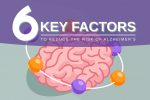Speaking More Than One Language Could Reduce Your Risk of Dementia
In terms of the American population, the nation as a whole is surprisingly monolingual. In fact, only around 15-20 percent of Americans consider themselves to be bilingual. Could this influence the nation’s neural health?
According to new research, published in Neuropsychologia, bilingualism changes the structure of the brain. This means that speaking more than one language may offer protective benefits against both mild cognitive impairment (MCI) and Alzheimer’s.
The Link Between Bilingualism and Dementia
After studying this topic for more than a decade, researchers have concluded that speaking a second language is good for your brain. However, this research was generally conducted on healthy younger or older adults.
This past week, researchers from Concordia University took these findings one step further. They reported that a second language may specifically support individuals with MCI and Alzheimer’s.
What they found was that knowing how to speak two languages exercises key areas of the brain. This led to greater grey matter density and increased cortical thickness. These structural differences were observed in the brains of multilingual patients with MCI and Alzheimer’s.
To summarize:
- The team at Concordia were the first to use this technique. Using high-resolution, whole brain MRA data along with various analysis techniques, they were able to measure specific areas of the brain. In this case, tissue density and cortical thickness.
- In comparison, previous studies used CT scans which are not as sensitive. This study was also the first of its kind to specifically study the structure of language and cognition regions in the brains of Alzheimer’s and MCI patients.
- In total, 34 monolingual MCI patients, 34 multilingual MCT patients, 13 monolingual Alzheimer»s patients, and 13 multilingual Alzheimer’s patients were studied.
- They concluded that speaking more than one language leads to greater neural plasticity. The researchers hypothesized that multilingual patients are able to compensate for tissue loss associated with Alzheimer’s, by accessing new neural networks or other brain regions.
Previous Findings Support This Theory
In 2013, researchers from the University of Edinburgh and Nizam’s Institute of Medical Sciences in India found that being bilingual may delay dementia onset.
After studying 648 individuals from India who had been diagnosed with dementia, they found that those who were bilingual developed dementia 4.5 years later than those who were monolingual.
- The average age of these patients was 66 years old.
- Of those studied, 240 had Alzheimer’s, 189 had vascular dementia, 116 had frontotemporal dementia, and the remaining 103 had either dementia with Lewy bodies or mixed dementia.
- As stated by the researchers, in places like Hyderabad, India, being bilingual is the norm — whereas monolingualism is the exception.
Why It Is More Challenging For Adults to Learn a New Language
If you have tried to learn a new language during your adult life, you know that it is not an easy task. It has been well-documented that adults have a harder time learning new languages than children, but why?
According to one study by MIT, trying harder may actually make this process more difficult. This means it may be adults’ greater cognitive abilities that cause confusion.
Referred to as a child’s sensitive period, younger individuals can typically pick up languages more easily until puberty. This is because, during this period, certain areas of the brain are more developed than others. More specifically, they lack fully developed memory systems.
In comparison, adults over-analyze aspects of language. This is particularly true regarding pronunciation, as the sounds we make are established early in life. More research is being conducted to see whether or not adults can go back and learn a new language as children do.
You can read more about MIT’s research here.
Although more challenging, this does not mean that learning a new language is impossible. In fact, experts encourage you to try. These ten tips, provided by The Guardian are a great starting point.

